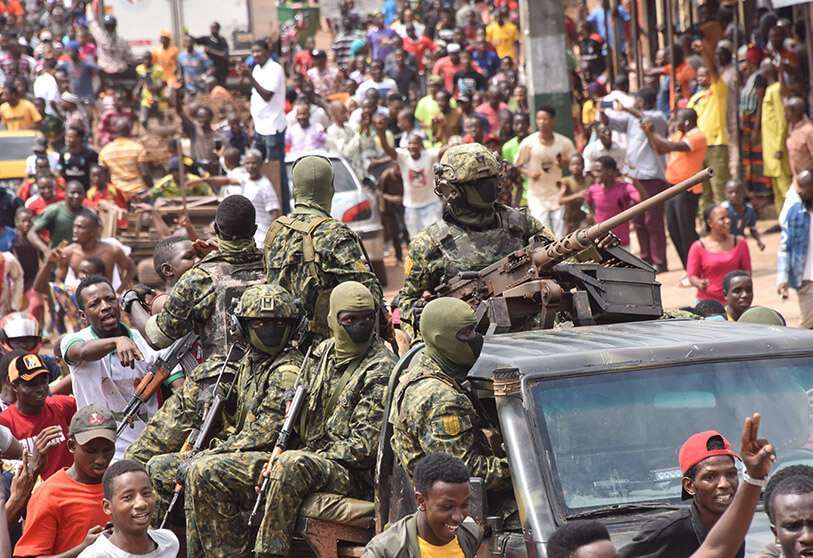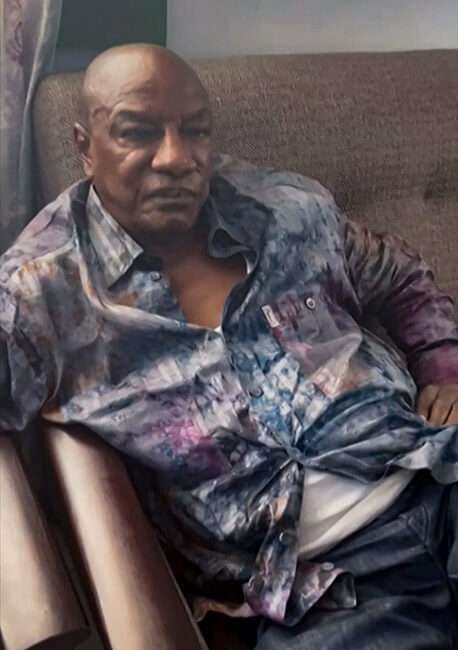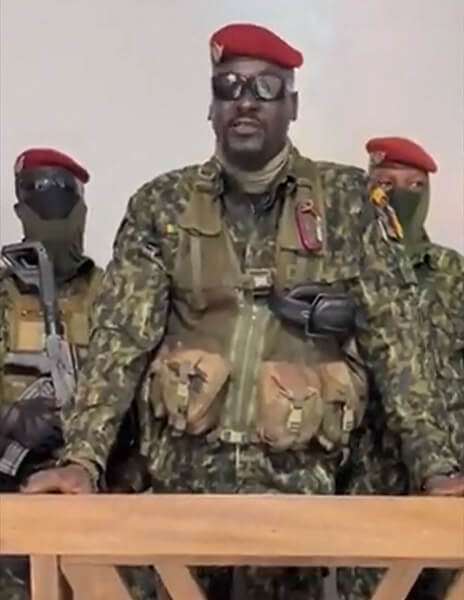Guinea: the scene of a new coup d'état

On the morning of 5 September, Special Forces troops deployed in the capital of the Guinean Republic, Conakry, sentencing the fate that once again awaited the African country. For several hours, Conakry staged an offensive between the Group of Special Forces (GFS) and the Republican Guard of Guinea, leading to a new coup, led by the leader of the GFS, Mamady Doumbouya.
After the access to the Presidential Palace was cut off, the now former president of the country, Alpha Condé, was captured and deposed. Following his deposition, Doumbouya announced the dissolution of the courts, the suspension of the constitution and the closure of the borders, as well as the establishment of the "National Committee for Reconstruction and Development", the body in charge of running the country.

"We call on our brothers in arms to unite to respond to the legitimate aspirations of the Guinean people, we invite them to stay in their barracks and to continue their activities, let us not make the mistakes of the past," he announced in a video recorded and broadcast to the population.
This statement has been welcomed by the population after Alpha Condé was plunged into controversy after deciding to run for a third presidential term in 2020, which would go against the provisions of the constitution. Since then, the opposition has been divided between those who opted to negotiate and those who preferred to execute an electoral boycott rather than dialogue. Following the decree of the coup, the current military junta will have to establish a new road map to decide whether the country will have a civilian government or a military government, as was the case during Lansana Conté's mandate between 1984 and 2008.

Guinea's new coup comes on the heels of a series of military coups that have ruled the country with violence and despotism. Since its independence from France in 1958, Guinea was ruled until 2010 by dictators, both military and civilian. It was only this year that the country witnessed its "first democratic elections", as announced by the United Nations after 50 years of independence.
In 1958, the year in which Guinea had its first president, Ahmed Sékou Toure, the country refused to join the then Franco-African political group proposed by French General Charles de Gaulle, thus proclaiming the state's independence.

However, Sékou became an undemocratic president who managed to hold the presidential title from 1958 to 1984. During his term of office, the former president implemented iron-fisted measures that banned freedom of the press or political opposition. After his death from heart failure at the age of 62, the then General Lasana Conte imposed a new military regime that would remain in place until 2008. Subsequently, a military council led by General Moussa Dadis Camara, who led a coup against Conte, was the victim of an assassination attempt in 2009 that forced him to flee the country. Subsequently, military commander Sekobi Konate took control of the interim government, succeeding President Camara who remained in exile in Burkina Faso as the country erupted in violent protests that killed 150 people, according to the United Nations.
Turning the political tide that had permeated Guinea for more than 50 years, President Konate pledged to restore civilian rule and work towards the restoration of constitutional institutions. Thus, Guinea witnessed its first democratic elections to elect a democratic president from among 24 candidates, among whom former prime ministers Selo Daline Diallo and Sidia Touré, as well as historical opponent Alpha Condé, emerged as favourites.

Both Condé and Diallo won the highest number of votes in the first round of the elections, while the second round was cancelled due to allegations of electoral fraud. Subsequently, the Guinean Electoral Commission declared Alpha Condé the winner of the presidential election with 52.5% of the vote.
However, Diallo's supporters claimed that the elections were rigged and did not accept the results, leading to intense clashes with the police. In this convulsive situation, former UN Secretary General Ban Ki-Moon urged the citizens of Guinea to "accept the results and resolve the clashes through legality".
Even so, political calm did not last long. Weeks after assuming power, Condé managed to survive an assassination attempt in 2011 following an attack by the military on his barracks, in which both of his bodyguards were killed.

In 2015 Condé won a second term in office after winning an absolute majority in the elections held on 11 October 2015. At a time when his mandate was coming to an end, the former president decided to implement a controversial constitutional bill that would allow him to stipulate himself for a third term. Despite rejection by the opposition, Condé won 91.59% of the support in a referendum.
In this line, in the 2020 elections, Condé managed to win the elections with an overwhelming victory corresponding to 2.4 million votes against 1.26 million for the opposition candidate, Dalene Diallo. Despite this, the opposition rejected the results and called on the population to rise up against the president.Opposition supporters set up barricades and clashed with the authorities, resulting in the deaths of dozens of demonstrators and police officers.
The political situation in Guinea continues to be convulsive. Despite timid attempts to establish democracy in the country, the impoverishment of the population, the economic crisis, insecurity and Condé's multiple attempts to hold on to power have led the country to return to the restoration of government through violence and force. This mix of economic and political rifts makes Guinea one of the most unstable countries on the African continent.








